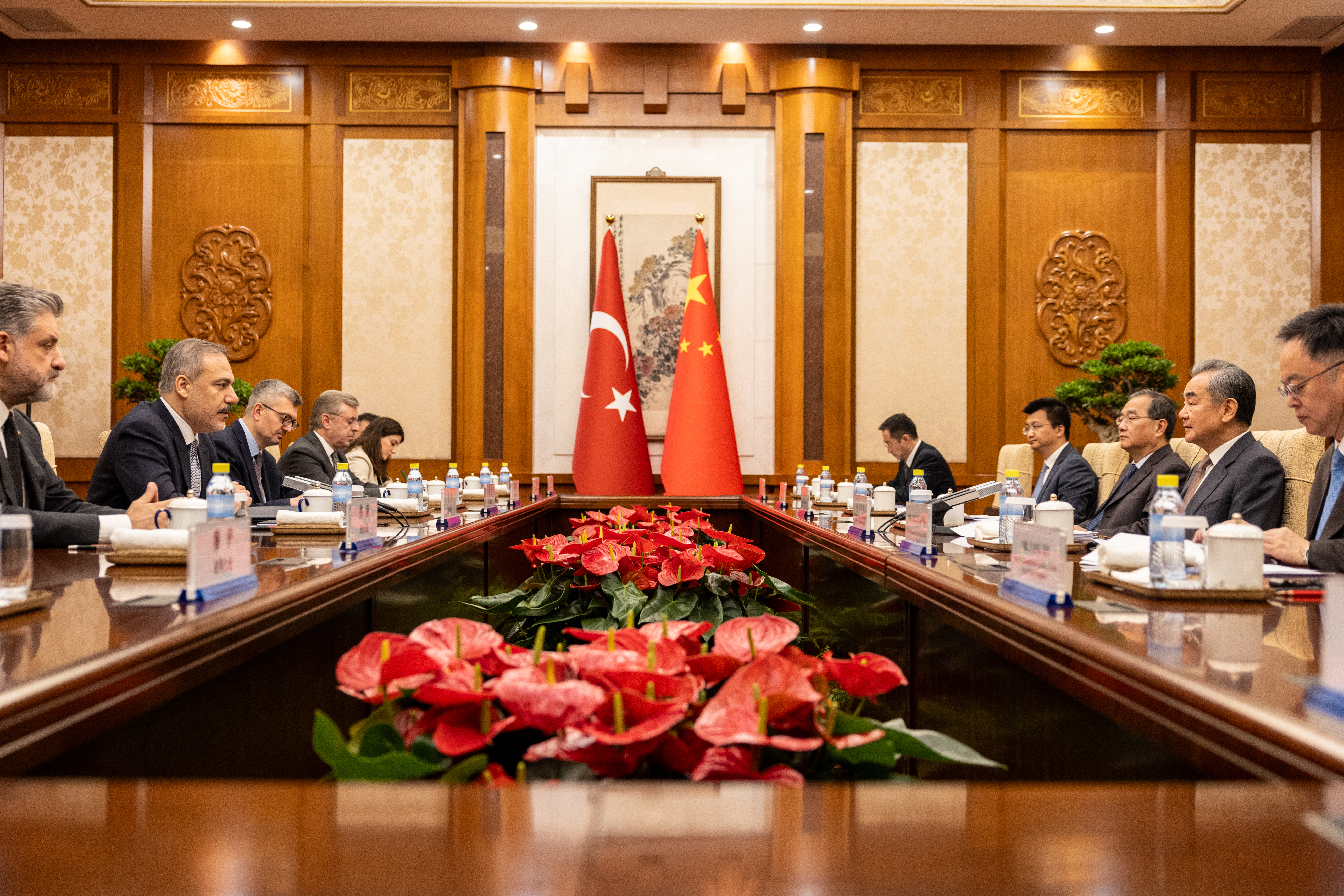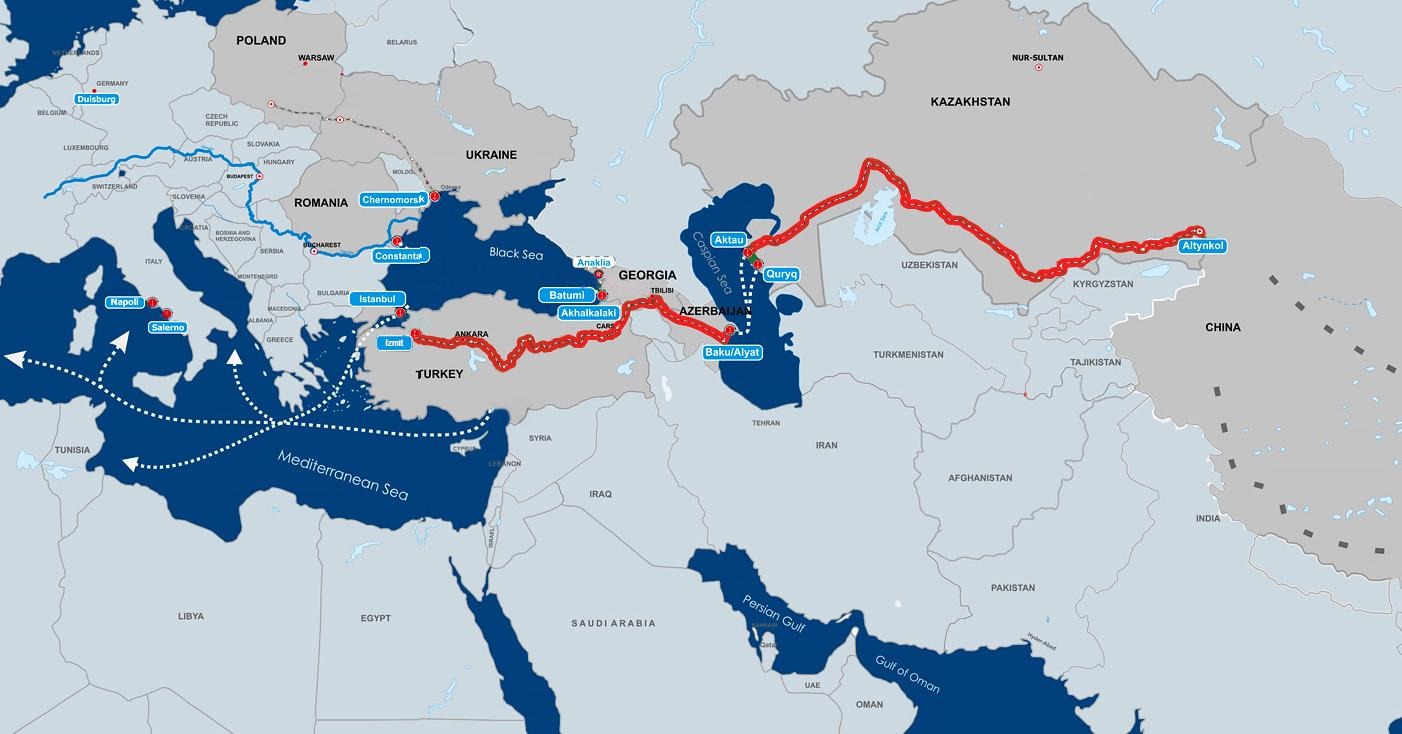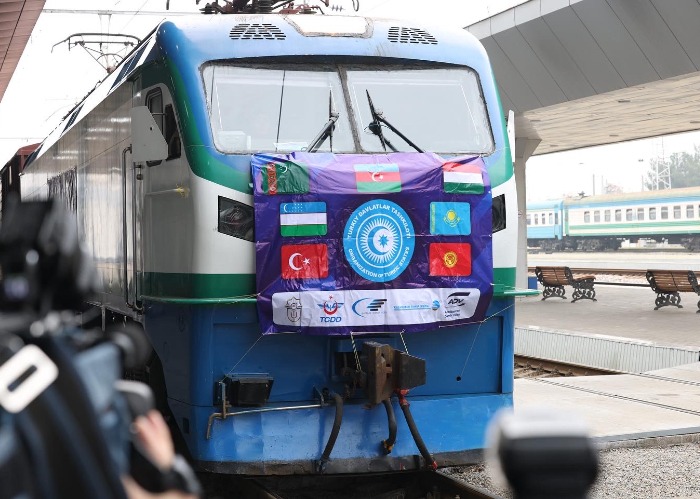
Foreign Minister Hakan Fidan’s visit to China from June 3-5 is significant for many reasons. China is considered the main rival to the U.S. in the global power struggle. Intelligence reports indicate that China could become the world’s strongest state by 2030. Consequently, Beijing is trying to increase its political influence by engaging in regional issues and taking steps to become a leading actor in global trade. The most important of these steps is the Belt and Road Initiative. Announced by Chinese President Xi Jinping during his visit to Kazakhstan in 2013, the project includes 154 countries, representing more than two-thirds of the world’s population and more than 50% of the global gross domestic product (GDP). In a period where global geopolitical tensions and crises are increasing, the Belt and Road Initiative, which focuses on cooperation through established and under-construction trade corridors, can be integrated with the Middle Corridor, a joint project of Türkiye and the Turkic world.  The cooperation opportunities centered around the Middle Corridor are among the key factors that increase the geopolitical importance of Fidan’s visit. China, the world’s production workshop, seeks to deliver its products to the European market via the shortest, most cost-effective, and safest route. The ideal route for China to access Europe is through the countries of the Turkic world, namely the Middle Corridor. The route starts from China’s Xinjiang Uygur Autonomous Region, focuses on the Caspian Sea transit via Central Asian countries, and extends to Europe through the Caucasus and Türkiye. This route is the shortest, most cost-effective, and safest for China to reach Europe, especially due to the normalization atmosphere in the Caucasus after the Second Karabakh War. Additionally, the importance of the Middle Corridor has increased globally due to the inoperability and insecurity of the Northern Corridor after the Russia-Ukraine War. The Middle Corridor can also be used as an energy corridor to transport Caspian gas and oil to Europe.
The cooperation opportunities centered around the Middle Corridor are among the key factors that increase the geopolitical importance of Fidan’s visit. China, the world’s production workshop, seeks to deliver its products to the European market via the shortest, most cost-effective, and safest route. The ideal route for China to access Europe is through the countries of the Turkic world, namely the Middle Corridor. The route starts from China’s Xinjiang Uygur Autonomous Region, focuses on the Caspian Sea transit via Central Asian countries, and extends to Europe through the Caucasus and Türkiye. This route is the shortest, most cost-effective, and safest for China to reach Europe, especially due to the normalization atmosphere in the Caucasus after the Second Karabakh War. Additionally, the importance of the Middle Corridor has increased globally due to the inoperability and insecurity of the Northern Corridor after the Russia-Ukraine War. The Middle Corridor can also be used as an energy corridor to transport Caspian gas and oil to Europe.  The Middle Corridor offers a win-win cooperation opportunity to all its stakeholders as a peace project. One of the main expectations of Fidan’s visit to China is China’s investments in the Middle Corridor and specifically in Türkiye, integrated with the Belt and Road Initiative. Minister Fidan emphasized this during a joint press conference with Chinese Foreign Minister Wang Yi: "Since China proposed the Belt and Road Initiative, there has been significant effort and progress. This initiative has both a maritime and a land component. We discussed how Türkiye can play a complementary role and how the Middle Corridor can be integrated with the Belt and Road Initiative in a mutually beneficial way." The Baku-Tbilisi-Kars Railway, Yavuz Sultan Selim and Osman Gazi bridges, Marmaray, Eurasia Tunnels, the 1915 Canakkale Bridge, divided roads, highways, high-speed train lines, logistics centers and communication infrastructures within Türkiye are crucial for the success of the Middle Corridor. Türkiye prioritizes implementing new investments with financial support from China.
The Middle Corridor offers a win-win cooperation opportunity to all its stakeholders as a peace project. One of the main expectations of Fidan’s visit to China is China’s investments in the Middle Corridor and specifically in Türkiye, integrated with the Belt and Road Initiative. Minister Fidan emphasized this during a joint press conference with Chinese Foreign Minister Wang Yi: "Since China proposed the Belt and Road Initiative, there has been significant effort and progress. This initiative has both a maritime and a land component. We discussed how Türkiye can play a complementary role and how the Middle Corridor can be integrated with the Belt and Road Initiative in a mutually beneficial way." The Baku-Tbilisi-Kars Railway, Yavuz Sultan Selim and Osman Gazi bridges, Marmaray, Eurasia Tunnels, the 1915 Canakkale Bridge, divided roads, highways, high-speed train lines, logistics centers and communication infrastructures within Türkiye are crucial for the success of the Middle Corridor. Türkiye prioritizes implementing new investments with financial support from China.  Beijing shares a similar vision. The Chinese administration is aware that supporting Türkiye with infrastructure investments can maximize benefits from Türkiye’s geopolitical position. Furthermore, the Middle Corridor aligns with China’s global vision politically. Beijing advocates for a multipolar world order, opposing the U.S.’s position as the sole global hegemonic power. The countries of the Turkic world also favor multipolarity through their multi-vector diplomacy. Similarly, Türkiye is one of the foremost actors demanding a more just world, as evidenced by President Recep Tayyip Erdogan’s assertion that "the world is bigger than five and a more just world is possible." Chinese Foreign Minister Wang emphasized the shared interests during a joint press conference with Fidan: "China and Türkiye are two major developing countries and representatives of emerging market economies. Our interests align on several issues. The two countries should strengthen cooperation within the framework of the Shanghai Cooperation Organization and other multilateral platforms, oppose all forms of hegemony and power politics, protect the stability of international industrial and supply chains, and guide global governance in a more just and reasonable direction." In short, the Middle Corridor can contribute to the search for a new global order beyond commercial cooperation, aligning with China’s expectations. The development of economic relations between Ankara and Beijing, centered around the Middle Corridor, represents a pursuit of a more just world. Many developments, such as the mutual expectation of a cease-fire in Gaza and efforts to end the Russia-Ukraine War, will contribute to the coordination of political relations alongside the development of commercial relations. Additionally, through the Middle Corridor, Türkiye can contribute to increasing the welfare of the Uighur Turks, who often come to the fore with human rights violations. The starting point of the Middle Corridor is the Xinjiang Uygur Autonomous Region, implying more investment in the region and potentially increasing the welfare of the Uighur Turks. After meeting with Chinese Foreign Minister Wang, Minister Fidan visited the Xinjiang Uygur Autonomous Region. In conclusion, the Middle Corridor is a massive initiative focused on mutual cooperation opportunities. Integrating this initiative with China’s Belt and Road Initiative holds numerous benefits, from increasing the welfare of the Uighur Turks to attracting Chinese investments to Türkiye, from seeking multipolarity to developing joint diplomatic efforts in the face of crises. Fidan’s visit to Beijing is a critical development in line with these expectations.
Beijing shares a similar vision. The Chinese administration is aware that supporting Türkiye with infrastructure investments can maximize benefits from Türkiye’s geopolitical position. Furthermore, the Middle Corridor aligns with China’s global vision politically. Beijing advocates for a multipolar world order, opposing the U.S.’s position as the sole global hegemonic power. The countries of the Turkic world also favor multipolarity through their multi-vector diplomacy. Similarly, Türkiye is one of the foremost actors demanding a more just world, as evidenced by President Recep Tayyip Erdogan’s assertion that "the world is bigger than five and a more just world is possible." Chinese Foreign Minister Wang emphasized the shared interests during a joint press conference with Fidan: "China and Türkiye are two major developing countries and representatives of emerging market economies. Our interests align on several issues. The two countries should strengthen cooperation within the framework of the Shanghai Cooperation Organization and other multilateral platforms, oppose all forms of hegemony and power politics, protect the stability of international industrial and supply chains, and guide global governance in a more just and reasonable direction." In short, the Middle Corridor can contribute to the search for a new global order beyond commercial cooperation, aligning with China’s expectations. The development of economic relations between Ankara and Beijing, centered around the Middle Corridor, represents a pursuit of a more just world. Many developments, such as the mutual expectation of a cease-fire in Gaza and efforts to end the Russia-Ukraine War, will contribute to the coordination of political relations alongside the development of commercial relations. Additionally, through the Middle Corridor, Türkiye can contribute to increasing the welfare of the Uighur Turks, who often come to the fore with human rights violations. The starting point of the Middle Corridor is the Xinjiang Uygur Autonomous Region, implying more investment in the region and potentially increasing the welfare of the Uighur Turks. After meeting with Chinese Foreign Minister Wang, Minister Fidan visited the Xinjiang Uygur Autonomous Region. In conclusion, the Middle Corridor is a massive initiative focused on mutual cooperation opportunities. Integrating this initiative with China’s Belt and Road Initiative holds numerous benefits, from increasing the welfare of the Uighur Turks to attracting Chinese investments to Türkiye, from seeking multipolarity to developing joint diplomatic efforts in the face of crises. Fidan’s visit to Beijing is a critical development in line with these expectations.